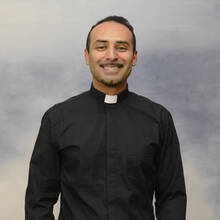The pedagogy of forgiveness
In our own day, we use Scripture for prayer and worship, and sometimes as a topic for academic study. It is easy to forget the versatile ways the Bible was used in Jesus’ day. It was a law code, a book of natural history, and a study of the political and economic realities of ancient Israel. It was also a school text that helped students train their minds and navigate life. The poetic portions of Scriptures, which make up important parts of this Sunday’s readings, were especially important as pedagogical tools for memory and study.
Lord, if my brother sins against me, how often must I forgive? As many as seven times? (Mt 18:21)
If you were to memorize a line or two of Scripture today, which verses would you choose?
How can you expand the scale of your forgiveness?
Have you grown more or less forgiving over time?
For example, take the parallel lines of biblical poetry from this Sunday’s first reading. The book of Sirach forms part of the corpus of wisdom literature in the Bible. The author took witty or common wisdom sayings and set them in verse form, probably to help students memorize them. An ancient teacher would recite the first half of the poetic line and the pupil would recite the second half. It is easy to visualize this ancient practice as one reads the lines, “Wrath and anger are hateful things / yet the sinner hugs them tight,” and “Forgive your neighbor’s injustice / then when you pray, your own sins will be forgiven” (Sir 27:30, 28:2). In theory, the ancient teacher could quiz students from any of Sirach’s 51 chapters..
Many people know well and have even memorized the refrain of this Sunday’s responsorial psalm: “The Lord is kind and merciful / slow to anger, rich in compassion” (Ps 103:8). The second half of the parallel focuses or intensifies the first; indeed, the Lord shows mercy and God’s compassion is rich. At the time of Jesus, the two most read and studied books from the Bible were, in fact, the Psalms and Isaiah. Like most children of his day, Jesus would have learned from his mother biblical passages like this one from Psalm 103.
Jesus the savior is also Jesus the poet.
Poetic pedagogy appears in this Sunday’s Gospel reading as well, when Peter asks a difficult question about forgiveness. Jesus had just finished an explanation of discipline towards an offender in the community, but Peter required further clarification, “How often must I forgive? As many as seven times?” (Mt 18:21). Jesus’ response needs unpacking, “I say to you, not seven times but seventy-seven times” (Mt 18:22). At first glance his response needs little explanation, one can understand that forgiveness runs deep and exceeds human limitation. But the experienced reader of the Bible picks up on the fact that with Jesus’ pithy saying we are now in the presence of poetry.
This line evokes one of the earliest lyrical verses from the Book of Genesis. There the allusion highlights the unlimited nature of Lamech’s vengeance, “If Cain is avenged seven times / then Lamech seventy-seven times” (Gn 4:24). By contrasting his teaching with the language of a well known poetic line, Jesus reveals the limitless nature of Christian forgiveness, and provides a helpful tool to remember a lesson worth keeping.
Jesus the savior is also Jesus the poet. Today’s Gospel provides a reminder of how scripture was used in the ancient world. The parable in this Sunday’s Gospel reinforces the poetic line at the end. The king and the wicked servant both try to settle their accounts. Their capacity to forgive debts, however, are set by different scales. Our readings this Sunday help us to pray about our own scale of forgiveness. We are asked to move past our limitations and these poetic lines help us to memorize the lesson.








